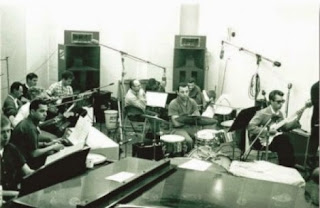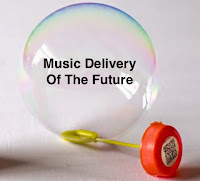"Fly Away" was one of Lenny Kravitz's biggest hits, reaching #1 in the UK and #12 in the US. The song also went on to a long history of use in commercials around the world.
Today we're going to look inside the song with an isolated vocal track that's pretty cool. Here's what to listen for.
1. The vocal is very compressed. You can especially hear it grab on the attacks of any loud phrases like the beginning of the chorus at "I want to get away." There's also a lot of sibilance that comes from the heavy compression that you don't necessarily hear in the full mix.
2. There's a medium-long reverb on the vocal that moves from right to left, with the left side being slightly longer. A very nice mixing touch.
3. Listen to the chorus effect that acts as a double during the chorus on "I want to fly away."
4. Also take note of the half-note delay on the background vocals, which is also added to the second verse of the lead vocal.
5. On the third chorus at 2:10 another background part enters ("With You") that's fairly dry so it pushes to the front of the mix.
Help Support This Blog
Friday, May 15, 2015
Lenny Kravitz "Fly Away" Isolated Vocals
Labels:
compression,
delay,
isolated vocals,
Lenny Kravitz,
reverb,
video
Thursday, May 14, 2015
Music On A DNA Molecule: Music Delivery Of The Future
I've written about data storage on DNA in the past, but now it looks like it's one step closer to fruition with a new project that encodes music onto synthetic DNA molecules.
The project is a collaboration between British scientist Dr. Nick Goldman (the inventor of the technique) and performance artist Charlotte Jarvis using specially commissioned music from the Kreutzer Quartet to store the music in the form of an MP3 file on DNA molecules that are suspended in a soap solution.
A Kickstarter campaign for the project aims to raise money to create installations where the listener can be have the soap bubbles pop on their skin and therefore be "bathed" in music. They call the project "Music of the Spheres."
The campaign has already exceeded its goal of around $7,500 USD with a week to go.
The whole thing sounds far-fetched at first, but if you think about it for a second, it could actually be a new and exciting way of music delivery. Not only that, it's an experience that can't easily be pirated (at least not yet), so it could actually be a way for artists to make money at some point.
Just imagine selling your album in the form of a bottle of bubble solution.
Check out the video below.
The project is a collaboration between British scientist Dr. Nick Goldman (the inventor of the technique) and performance artist Charlotte Jarvis using specially commissioned music from the Kreutzer Quartet to store the music in the form of an MP3 file on DNA molecules that are suspended in a soap solution.
A Kickstarter campaign for the project aims to raise money to create installations where the listener can be have the soap bubbles pop on their skin and therefore be "bathed" in music. They call the project "Music of the Spheres."
The campaign has already exceeded its goal of around $7,500 USD with a week to go.
The whole thing sounds far-fetched at first, but if you think about it for a second, it could actually be a new and exciting way of music delivery. Not only that, it's an experience that can't easily be pirated (at least not yet), so it could actually be a way for artists to make money at some point.
Just imagine selling your album in the form of a bottle of bubble solution.
Check out the video below.
Wednesday, May 13, 2015
6 Things All Great Studio Musicians Have In Common
 |
| The ultimate group of studio musicians - The Wrecking Crew |
Here's an excerpt from The Studio Musician's Handbook (which I wrote with the great studio bass player Paul ILL) that takes a look at everything expected when you hire some for a studio gig.
A studio musician:
1. Has Great Chops - Studio musicians are expected to be creative, extremely versatile, and have a formidable skill set. They are usually the best musicians in town in terms of plain physical dexterity, and are able to play numerous styles convincingly.
Your ability to read music will determine the type of sessions you can play on. For record dates, the ability to read and transcribe lead sheets is essential, but many other sessions like jingles and television and movie scores require expert sight reading.
2. Has Great Gear - A wide variety of gear in excellent working order is a must. Having only one sound makes for a boring recording, so the wider the variety of sounds you can get or the more you can double on other instruments, the more valuable you become.
3. Is Easy To Work With - Your reputation among other musicians and those in our industry who make the recordings is what gets you hired and keeps you working, so if other session musicians, producers and engineers like you as a person, like how you play, and like the feeling you bring to a session, then you’re more likely to get calls for work.
Smiles and a pleasant, accommodating attitude, as well as superb personal hygiene and an appropriate sense of style go really far in the session business. There are a lot of great players out there and unless you’re something unbelievably special, the people paying your check will always take the easiest to work with all things being equal. No back-talk, no sass, no snide remarks, nothing other than a wide smile and a “Tell me what you want,” and “No Problem!” attitude.
4. Has No Ego - Everyone has their own idea of how they should sound, how the song should be played, how others should be playing it, and a host of other musical items both large and small. That all goes out the window when you’re being hired to play on someone’s recording.
You’ve got to have a thick skin while recording, and realize that even if the artist-producer-songwriter listens to your idea it might not carry much weight or be acted upon. If they listen to you and actually use one of your suggestions, consider it a good day.
5. Takes Criticism Well - If you have a fragile ego, being a session musician is not for you. Except for the times when you’re playing a written part, you can bet that every take is going to be listened to under a microscope and picked apart with a fine toothed comb.
As difficult as that might seem, you can’t take this personally because the artist-producer-songwriter only wants what’s best for the song. You may play a part with a bitchin’ feel, but if the sound isn’t right and doesn’t mesh with the track, chances are you’ll do it again.
6. Uses Proper Studio Etiquette - There’s a way to do things in the studio and it differs from playing live. A studio musician’s protocol exists and you’ll be expected to abide by it.
There's an entire chapter dedicated to this in The Studio Musician's Handbook, but suffice it to say that if you like being the center of attention, studio work may not be for you.
To read additional excerpts from The Studio Musician's Handbook and my other books, go to the excerpts section of bobbyowsinski.com.
Tuesday, May 12, 2015
Icon Collective's David Alexander On My Latest Inner Circle Podcast
Co-founder David Alexander has a background as a touring musician, a producer, composer of hit video games like Quake II and III and James Bond 007, and he's my guest on this week's podcast.
During the episode's intro I'll discuss Tunecore being sold and a brief look at life on a tour bus.
More Evidence Of Big Changes Coming To Guitar Center
Guitar Center has been in and out of the news lately mostly thanks to Eric Garland’s excellent analysis of the company’s woeful financial state. The huge musical instrument retailer has been treading water for some time, but now it looks like it might be readying itself to finally sink.
To recap, Guitar Center was acquired in 2007 by Bain Capital, who took on a huge debt load of $1.6 billion in the process. More recently Bain’s partner Ares Management turned it’s debt into equity when Bain had trouble making payments and took over the management of GC. Suddenly there was less inventory, fewer SKUs and fewer vendors, but there was also the matter of 5 stores unionizing. Ares was allegedly very slow in negotiating a union contract with these stores and was then hit by an unfair practice charges by the Retail Workers Union to the National Labor Relations Board.
Garland has stated all along that this was a financial hole that GC could probably never crawl out of, and that at some point the company would have to declare bankruptcy and regroup. The latest evidence that this might might be in the offing comes from a new employee agreement (as seen below) that resulted in decreasing sales commissions from 10% on profit and 2% on gross down to 0.25%.
Not only that, the company has decreased the number of work hours for both salesman and managers to the point where the inside joke is that the company is at “liquidation staffing” levels. To grind the corporate heel in the salesman’s face just a little more, the company has raised the cost for employees to purchase new gear (one of the major reasons for musicians wanting to work there) by 10 to 15%. Read more on Forbes.
Labels:
Ares Management,
Bain Capital,
Forbes,
Guitar Center,
sales commissions
Monday, May 11, 2015
New Music Gear Monday: Yamaha Raijin Drum Cube
This may be just a prototype, but it's so different that I had to include it in New Music Gear Monday. It's the Yamaha Raiijin Drum Cube, a whole new way to play drums.
Raiijin is Japanese for thunder, which is an appropriate name for this ball of drums. And what's interesting about this is that it was designed by the Motor division of Yamaha and not the music instrument division for one of it's inter-company competitions (called AH A May or Yamaha spelled backwards).
While the Drum Cube might look cool, I'm not so sure it's practical. First of all the drums radiate in a circle, which might be a problem if they're not all miked. The fact that there's a lot of places to hang mics from would be a positive though. And the one thing you don't see happening on the following demo is the drummer just laying down a beat.
It looks pretty uncomfortable too, but that would mean that you'd never have a drummer slacking off during a gig.
Thanks to my buddy Jesse Siemanis for the heads up.
Raiijin is Japanese for thunder, which is an appropriate name for this ball of drums. And what's interesting about this is that it was designed by the Motor division of Yamaha and not the music instrument division for one of it's inter-company competitions (called AH A May or Yamaha spelled backwards).
While the Drum Cube might look cool, I'm not so sure it's practical. First of all the drums radiate in a circle, which might be a problem if they're not all miked. The fact that there's a lot of places to hang mics from would be a positive though. And the one thing you don't see happening on the following demo is the drummer just laying down a beat.
It looks pretty uncomfortable too, but that would mean that you'd never have a drummer slacking off during a gig.
Thanks to my buddy Jesse Siemanis for the heads up.
Labels:
drums,
New Music Gear Monday,
Raiijin Drum Cube,
video,
Yamaha
Subscribe to:
Comments (Atom)






